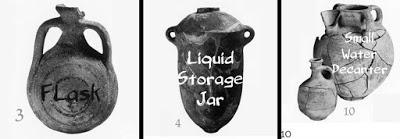God told the prophets to speak His word. He also told them to act in little morality plays, performing various actions which were symbols of what God planned to do. These are called sign acts or symbolic actions. They were frequent in the Old Testament. Who can forget Ezekiel baking bread over dung, or lying on his side for 390 days; Isaiah going naked for three years or Hosea instructed to marry a prostitute. Sign acts were a typical way of instruction in the Middle East at that time. In addition, God using symbols and sign acts are a language that doesn't mistranslate and is readily understood by the intended recipients of the sign act.
In Jeremiah 19 we have the story of the broken flask. The word baqaq is actually translated flask but it's not the kind of flask we think of that contains liquor and can be tucked into a pocket. Baqaq is also translated bottle. In the article at The Penn Museum from Expedition Magazine, titled The Pottery of the Old Testament by Frances W. James, we see the following examples unearthed during the BC era. We don't know exactly which pottery it was that Jeremiah shattered in his sign act, but it was likely one of these, according to the article:

Let's get to the passage. Jeremiah 19:1-2,
Thus says the Lord, “Go, buy a potter's earthenware flask, and take some of the elders of the people and some of the elders of the priests, 2 and go out to the Valley of the Son of Hinnom at the entry of the Potsherd Gate, and proclaim there the words that I tell you.
After Jeremiah speaks the prophecy, he is instructed to perform the following sign act,
Then you shall break the flask in the sight of the men who go with you, 11 and shall say to them, ‘Thus says the Lord of hosts: So will I break this people and this city, as one breaks a potter's vessel, so that it can never be mended. (Jeremiah 19:10-11).
It must have been a dramatic moment. We can picture Jeremiah in his prophet's robe, raising his arms over his head to get a good angle, and forcefully thrusting the bottle to the earth, where it shattered into many pieces at the priests' and elders' feet. Dust flying up, pieces wobbling as they skittered around their legs.
Why a shattered piece of pottery? In the previous chapter the comparison was to softer clay. In Jeremiah 18:4 we see that as the potter works the clay, if it gets spoiled, it can be reworked into another vessel.
However, in chapter 19:15 we see the clay has become quite hardened. The word in the translation is stiffened but the Hebrew it means hardened. Hardened clay cannot be reworked. If it breaks, it cannot be repaired for its intended use. As we see in the photos above of the excavated pots, the repair gives an idea of the shape, but the vessel can no longer reliably hold liquid. All one can do is break it... and start over.
God is saying that the Israelites have become so hardened in their idolatry that the LORD'S words are having no effect. They must be shattered. And they were shattered, the Babylonians wrecked Jerusalem and carried off the people, shattering them and scattering them far and wide, until they were like the shards of Jeremiah's broken vessel, skittering in the dust at God's feet. Jeremiah ministered from 626–586 B.C. Jerusalem later fell to the Babylonian army in 587 BC.
Matthew Henry concludes the scene of the sign act,
The contempt of the prophecies is here the sin charged upon them, as the procuring cause of this judgment. It is because they have hardened their necks, and would not bow and bend them to the yoke of God’s commands, would not hear my words, that is, would not heed them and yield obedience to them.
Note, The obstinacy of sinners in their sinful ways is altogether their own fault; if their necks are hardened, it is their own act and deed, they have hardened them; if they are deaf to the word of God, it is because they have stopped their own ears. We have need therefore to pray that God, by his grace, would deliver us from hardness of heart and contempt of his word and commandments. Henry, M. (1994).
Matthew Henry’s commentary on the whole Bible: complete and unabridged in one volume (p. 1266). Peabody: Hendrickson.
How are we, today? Do we practice idolatry? Have we hardened ourselves so the word of God simply bounces off our ears and minds? Or are we softer clay, ready and willing to be molded? The molding is into His likeness, no better vessel can we be than that.
